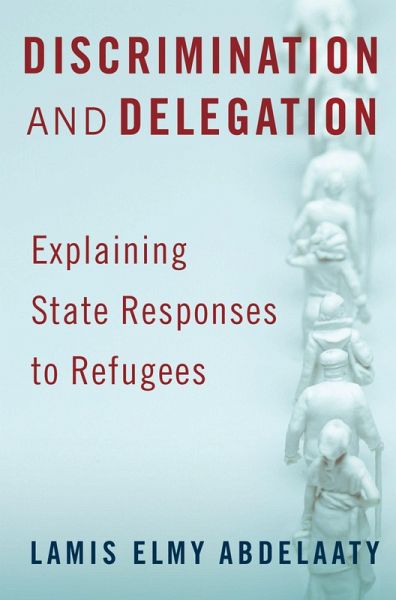
Discrimination and Delegation (eBook, PDF)
Explaining State Responses to Refugees
Versandkostenfrei!
Sofort per Download lieferbar
15,95 €
inkl. MwSt.
Weitere Ausgaben:

PAYBACK Punkte
8 °P sammeln!
What explains the variety of responses that states adopt toward different refugee groups? Refugees might be granted protection or turned away; they might be permitted to live where they wish and earn an income, pursue education, and access medical treatment; or, they might be confined to a camp and forced to rely on aid while being denied basic services. However, states do not consistently wield their capacity for control, nor do they jealously guard their authority to regulate. In this book, Lamis Elmy Abdelaaty asks why states sometimes assert their sovereignty vis-à-vis refugee rights and ...
What explains the variety of responses that states adopt toward different refugee groups? Refugees might be granted protection or turned away; they might be permitted to live where they wish and earn an income, pursue education, and access medical treatment; or, they might be confined to a camp and forced to rely on aid while being denied basic services. However, states do not consistently wield their capacity for control, nor do they jealously guard their authority to regulate. In this book, Lamis Elmy Abdelaaty asks why states sometimes assert their sovereignty vis-à-vis refugee rights and at other times seemingly cede it by delegating refugee oversight to the United Nations. To explain this selective exercise of sovereignty, Abdelaaty develops a two-part theoretical framework in which policymakers in refugee-receiving countries weigh international and domestic concerns. Policymakers in a receiving country might decide to offer protection to refugees from a rival country in order to undermine the sending country's stability, saddle it with reputation costs, and even engage in guerilla-style cross-border attacks. At the domestic level, policymakers consider political competition among ethnic groups--welcoming refugees who are ethnic kin of citizens can satisfy domestic constituencies, expand the base of support for the government, and encourage mobilization along ethnic lines. When these international and domestic incentives conflict, the state shifts responsibility for refugees to the UN, which allows policymakers to placate both refugee-sending countries and domestic constituencies. Abdelaaty analyzes asylum admissions worldwide, and then examines three case studies in-depth: Egypt (a country that is broadly representative of most refugee recipients), Turkey (an outlier that has limited the geographic application of the Refugee Convention), and Kenya (home to one of the largest refugee populations in the world). Discrimination and Delegation argues that foreign policy and ethnic identity, more so than resources, humanitarianism, or labor skills, shape reactions to refugees.
Dieser Download kann aus rechtlichen Gründen nur mit Rechnungsadresse in A, B, BG, CY, CZ, D, DK, EW, E, FIN, F, GR, HR, H, IRL, I, LT, L, LR, M, NL, PL, P, R, S, SLO, SK ausgeliefert werden.













